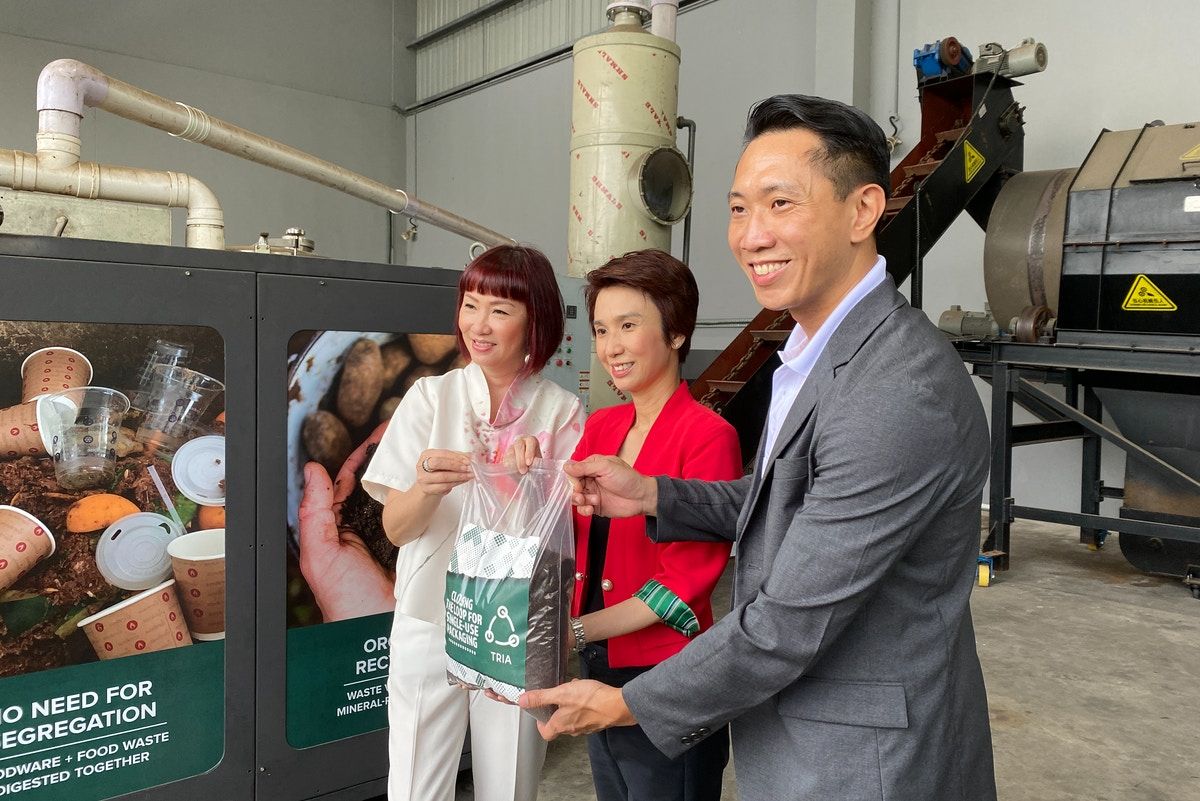Has KFC Found the Secret Sauce to Circular Packaging?

Traditional plastic recycling faces many challenges in Singapore. Even if food packaging is technically recyclable, separating and cleaning it can cost five times more than building a new packaging from scratch. In addition, most of the country’s plastic is incinerated. Plastic waste is expected to increase as there is little incentive to recycle or reduce plastic consumption. Since 2017, plastic recycling rates have been very low and are usually floating. 4-6 percent.
TRIA’s patented Bio24 Digester can turn NEUTRIA packaging and food waste into compost within 24 hours.Image: Eco-business
TRIA claims that its products are relatively cost-competitive without compromising sustainability. However, apart from ensuring the economic feasibility of the product, TRIA CEO Ng Pei Kang said that sustainable food companies should make such packages more widely accepted. We need to prioritize the operational needs of our F & B partners.
“I think it’s great that we’re experimenting. [sustainable foodware like reusable cups], But we also need to be more sympathetic to food brands. How can KFC expand to 20,000 stores that own it without changing its operations? [With our model], They don’t have to hire more people or get a new trash can.If it’s not business as usual, it would be very difficult [for restaurants to accept these new packaging products].. Ng said in an interview with Eco-Business.
At the pilot launch event at Shanaya Environmental Services’ recycling plant on June 21, KFC’s cost competitiveness, design flexibility and operational resiliency were the main factors that made TRIA’s products attractive. Clarified that there are some.
“Since 2017, we have been looking for new ways to reduce the use of non-recyclable packages. Previously we considered edible spoons, but could not meet the cost and operational requirements. , TRIA has embraced extensive redesign and testing to ensure that the product can withstand daily operational needs and can be collected and processed at an acceptable price, “said Lynette Lim, KFC’s general manager. Said in an interview with Eco-Business.
Mashed potatoes / coleslaw cups, cutlery, pockets and mats were made in NEUTRIA by TRIA for a 6-month pilot at KFC.Image: Eco-business
Redesigning KFC’s mashed potatoes and coleslaw cups was especially difficult for TRIA designers. Using the company’s plant-based material, the cups had to maintain their structural integrity when stacked, in addition to heat resistance and moisture resistance. Although not yet tested in store conditions, Lim cites this as an example of TRIA’s commitment to KFC’s operational standards.
For every ton of nutria and food waste supplied to the digestion tank, TRIA claims to be able to produce 200-300 kg of compost. The company has not yet signed an off-take contract for compost, but has signed a memorandum of understanding (MOU) with local roof farming company Comcrop and Norwegian chemical fertilizer company Yara International. Ng also emphasized how TRIA’s products and services help these companies achieve their unique business goals in a more profitable and sustainable way.
“Yarra is trying to expand its presence in the region here. I think they are interested in our products because they have the potential to be a source of low carbon fertilizers. In Europe, water The availability of hydroponics makes it possible to produce low-carbon green fertilizers in a profitable way. However, transporting this fertilizer to Asia is not feasible. That is our turn. ” Explained.
A finished bag of compost made from NEUTRIA packaging and food waste. Image: Eco-business.
In future biovalue pilots, Yarra wants to produce bioequivalent fertilizers from TRIA compost. Upon receiving TRIA’s products, Yarra could theoretically adjust the nitrogen, potassium, and phosphorus content to be nutritionally comparable to commercial fertilizers. In addition to reducing costs, the closed-loop system can track fertilizers, increasing the confidence of future buyers.
However, TRIA’s technology is not without its drawbacks. The composting system relies on TRIA’s ability to take ownership and reprocess waste after consumption. Singapore Extended Producer Responsibility (EPR) Act Packaging by 2025 will reduce public spending and the amount of waste sent to landfills. Nonetheless, Professor Seeram Ramakrishna, a professor of mechanical engineering and chair of the Circular Economy Task Force at the National University of Singapore (NUS), pointed out the difficulties in achieving EPR.
)
)
)